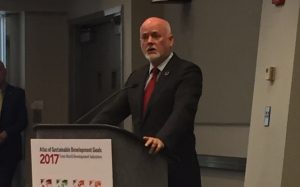As delivered
Remarks by Peter Thomson, President of the UN General Assembly at World Bank Spring Meetings Seminar Implementing the 2030 Agenda: From Commitment to Action
20 April 2017
H.E. Ms. Amina Mohammed, Deputy Secretary-General of the United Nations,
Mr. Mahmoud Mohieldin, World Bank Group Senior Vice-President for the 2030 Development Agenda, United Nations Relations, and Partnerships,
Excellencies,
Ladies and Gentlemen,
Thank you to the World Bank for convening this event, and for helping to foment a global conversation on moving the 2030 Agenda for Sustainable Development from commitment to action.
Nearly a year and a half into the implementation phase of the Sustainable Development Goals, we are already seeing important strides being made across the world.
Most Governments have moved to incorporate the SDGs into their national development plans and budgetary processes, and many international institutions, civil society organizations, and businesses have begun to frame their work in the direction of SDG action.
Indeed, 44 countries will be presenting their National Voluntary Reviews at the UN’s High Level Political Forum in July – a doubling of the number of countries that did so last year.
While the early steps towards SDG implementation are positive, there clearly remains far more to be done to build on this momentum and catalyze it into a transformational change.
In this regard, the SDGs comprehensive and integrated nature compels us to look at cross-cutting implementation action that will drive the achievement of all 17 SDGs across the world.
With this objective in mind, throughout the 71st Session of the General Assembly we have sought to drive a universal push for meaningful progress in implementing all of the SDGs. This has included convening a number of High-level SDG Action Events aimed at driving cross-cutting implementation efforts.
Indeed, cognizant that sustainable financing was emerging as a constraint that could undermine our efforts to reach the speed and scale needed to achieve the SDGs by 2030, two days ago, I convened a High-Level SDG Financing Lab at UN Headquarters.
The event brought together key partners from across Government, the World Bank Group, civil society and the private sector, to discuss ways to mobilize the resources needed to achieve the SDGs and support the world’s long-term sustainable development objectives. I thank, in particular, Amina Mohammed and Mahmoud Mohieldin for leading off the day’s discussions.
A number of key findings emerged from the day’s dialogue.
Firstly, the financing needed to fund the SDGs already exists around the world. The key is to align global financial systems to sustainable development, and to get the right incentives and regulatory frameworks in place to shift investments towards sectors that advance SDG implementation.
To this end, reporting criteria and guidelines, such as SDG-consistent certification standards, or ‘SDG ratings’, could be established for relevant business and financial sector actors.
Secondly, that for business, the SDGs make economic sense. Estimates suggest that SDG implementation has the potential to generate trillions of dollars in market opportunities, and many private sector actors are already reporting that the reputational gains from their SDG actions are improving their bottom lines.
Nevertheless, despite support for sustainable investments, the availability of financing, and the ongoing development of bankable and sustainable projects, there continues to be a market failure that hinders the flow of financing towards sustainable investment options, and which requires further attention.
And thirdly, that the United Nations has an important role to play in facilitating this discourse. In addition to its critical role in the follow up and review of Member States implementation of the SDGs through the High-Level Political Forum, the UN can also help to provide a platform to bring together the public and private sectors to facilitate dialogue and bridge understanding on shared interests and goals.
To this end, the UN must look to build its institutional capacity at both Headquarters and in the field to help build up sustainable projects, and facilitate access to capital.
In this context, the World Bank and other multilateral development banks were highlighted as having a vital role to play in scaling-up and leveraging their investments to develop sustainable financial systems.
Of course, driving SDG action requires effective and efficient decision-making based on timely and reliable data.
Member States reporting to the HLPF review mechanism need to be able to measure their progress against the UN’s global indicator framework, and need to be supported in their efforts to collect, analyze, and disaggregate the unparalleled amount of global data being generated.
In this regard, the World Bank Group once again has a critical role to play through its work to measure and chart each country’s progress towards the achievement of the SDGs.
The SDG Atlas launched today is an important example of how such data can be synthesized and made available to Governments and other stakeholders to guide SDG decision-making.
Excellencies,
For the Sustainable Development Goals to be achieved by 2030, we must break free of old ways of thinking, partnering, financing, and delivering on the ground, and instead work together to further embed the SDGs into the heart of international politics, Government planning, stakeholder action, and – most critically of all – the public consciousness.
In this regard, the central message that must be amplified, is that realising the goals of the 2030 Sustainable Development Agenda, taken together with the Paris Climate Agreement, represents the best path we have to ensure global conditions that secure sustainability for humanity’s place on this planet.
I thank you.


